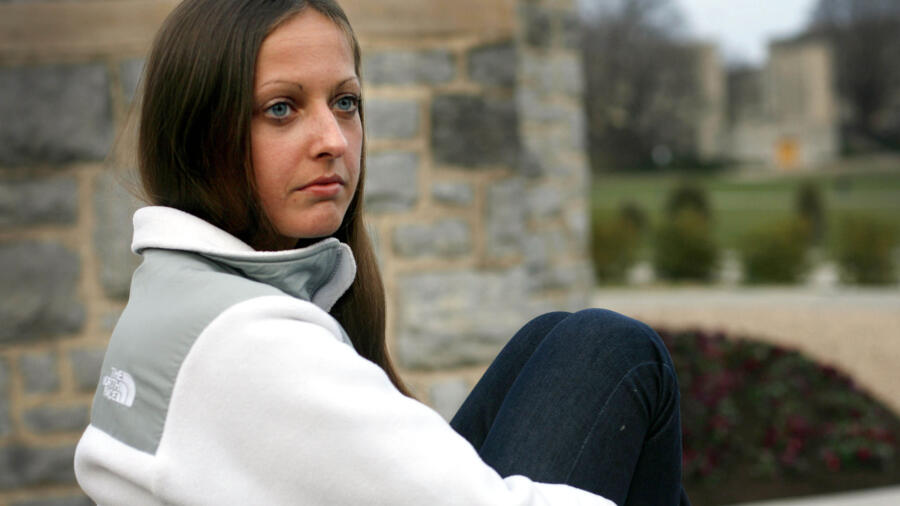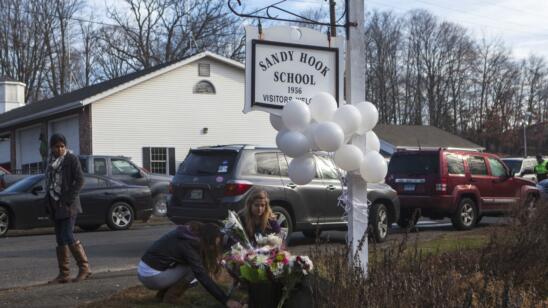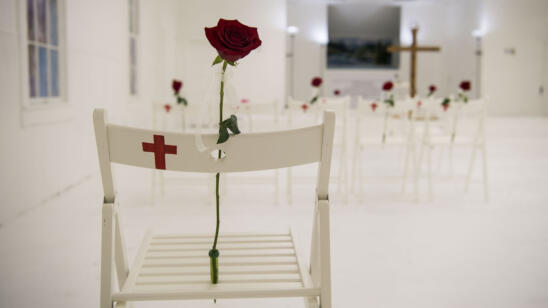On April 16, 2007, Kristina Anderson was critically wounded but survived the Virginia Tech mass shooting, where 32 people were killed and countless others injured by a gunman, a student at the university. Up until the 2016 massacre at Pulse nightclub in Orlando and the recent tragedy at a concert in Las Vegas, the event at Virginia Tech was the deadliest mass shooting in modern U.S. history.
Anderson went on to found the Koshka Foundation, a nonprofit that consults with universities and schools on how to prevent, respond to and heal from violence.
Anderson tells A&E her story about that tragic day in class when a gunman stormed in —and what one can do to prepare for an active-shooter scenario.
Tell us what you remember about the day of the shooting.
I was running late to an intermediate French class. That morning my friend drove me to class because we had three classes back-to-back. We walked in fairly late and sat in the back corner of the room, as we always did.
A young woman walked in after that. What we didn’t know was that there’d been an earlier shooting that morning in her dormitory. There should’ve been more curiosity on my part… but there were no laptops in class. I had a T-Mobile flip phone, so I wasn’t looking things up.
[Watch I Survived…: Virginia Tech Massacre/Minneapolis School Bus Crash on A&E Crime Central.]
I felt the intensity in the walls as he started [shooting]. [We were] in a small room, Room 211, and there’s only one door. He was shooting in the hallway and I felt this pounding on my right side and the most frightening part was I felt it escalate, moving from the back, on my side, up. The sheer noise of it getting closer and closer told me something was going to happen.
The professor went into the hallway and came back. She looked panicked and scared and said, ‘Call 911.’
I went to middle school in California, so I reverted to earthquake training. I got on the floor under my seat and tried to make myself into a small ball.
I saw him burst through the door. He went to the other side of the classroom, directly diagonal from where I was. I looked up and I saw what I can now process as being two handguns—I blocked it out at the moment—and his torso.
He went down the rows of people opening fire. He fired a lot of rounds. I thought, ‘Your turn is going to come, so be ready,’ and I clenched my fists.
I was shot in the back the first time. Then he left.
When he came back later it was a lot scarier, because I could sense he was looking to see who was alive. I tried to hold my stomach in, because it was moving. He shot above my head and I looked up—which I shouldn’t have—to see the bullet hole in the wall. Then he shot me again and this time it was in my lower back. My butt, actually. My right toe received a ricochet.
I don’t think I realized how bad it was until I woke up in the hospital, where my parents told me that he had killed 12 people in my room.
Does it seem like surviving a mass-shooting attack is just a matter of luck?
There’s validity to that. There’s not much we could’ve done. But the bigger picture isn’t what can be done at the last possible moment, it’s how we can prevent these things from happening in the first place. People saw [the gunman] chain the doors shut. People saw him practicing at gun ranges. People saw him writing profane things. The responsibility falls upon all of us throughout our entire lives.
There’s a lot we can do as schools or companies or families. You can add locks on doors. You can add visitor-management systems. You can add a school-resource officer, a trained law-enforcement officer.
But what do you do if there’s an active shooter? I’m always very much aware of what I can use in my immediate environment. How many doors are in a space? I think about what I could move if I had to push a desk or a door. Know your exits, know your spaces and know what’s available to you.
Two doors down from us, 10 students successfully barricaded the door. They all survived. The ability to form a distance, barrier or delay is important, because police response is going to be very quick.
What do you wish you’d been told prior to the shooting to better prepare you?
I wish someone had said ‘This type of event might happen to you.’
I didn’t take any self-efficacy steps. I didn’t go to the door. I didn’t check. I didn’t call the police. I wish I’d been taught to think on my own, and to respond faster.
Does a part of you wish that you or a classmate or the professor had a gun at hand?
There’s no part of me that wishes that for myself. There’s a big part of me that wishes [the gunman] didn’t have two guns in his hands.
I want campus law enforcement trained and armed. They’re the only ones I want armed. And there are campus law enforcement that aren’t armed and should be—they don’t want students to feel like they’re unsafe. But if police don’t have firearms what do you expect to happen if there’s an active shooter?
Let’s talk specific scenarios. What should you do if you hear a shooter, but don’t see them?
You’re presupposing the person will know it’s a gunshot. Most people will not react to the first sound of gun violence. They think it’s construction or fireworks.
Safely go investigate to find out what that noise is. If it ends up being a violent offender or perpetrator, go inform others, call 911 and let them know exactly where you are. Worst thing that happens: They investigate and it’s a tractor outside.
Do not tweet that there’s an active shooter. Call.
When is it a good idea to try to overpower a shooter?
When you’re fighting for your life. That’s the only real answer.
As people, we can do training in advance so if we’re ever put in that position we can know how to tackle someone or how to break a window to get out. But the scary part about all this is at the end of the day, you’re by yourself and your safety is your own.
Read more:
How Do Coroners Handle a Mass Tragedy Like the Las Vegas Shooting?


